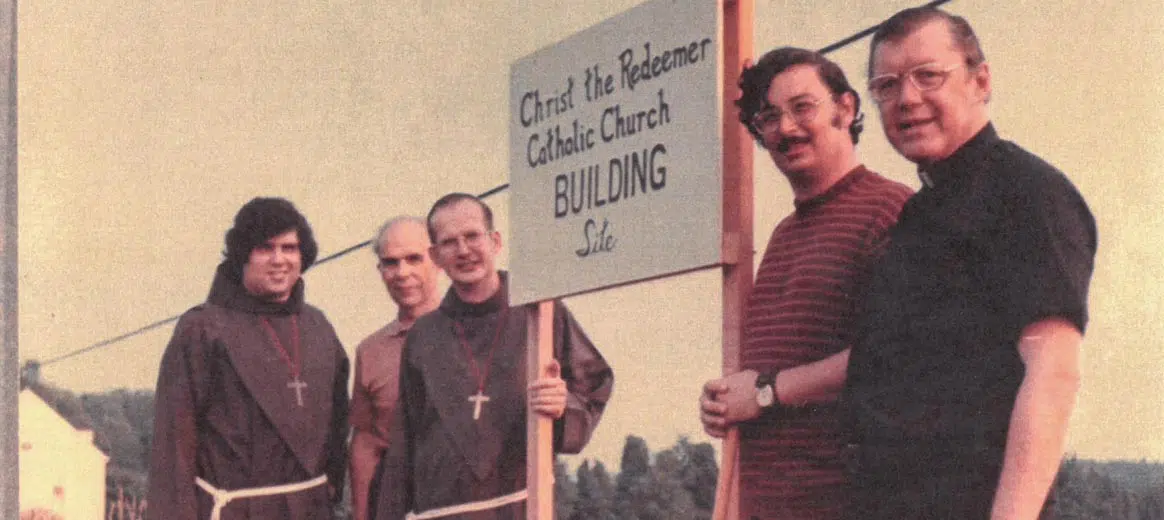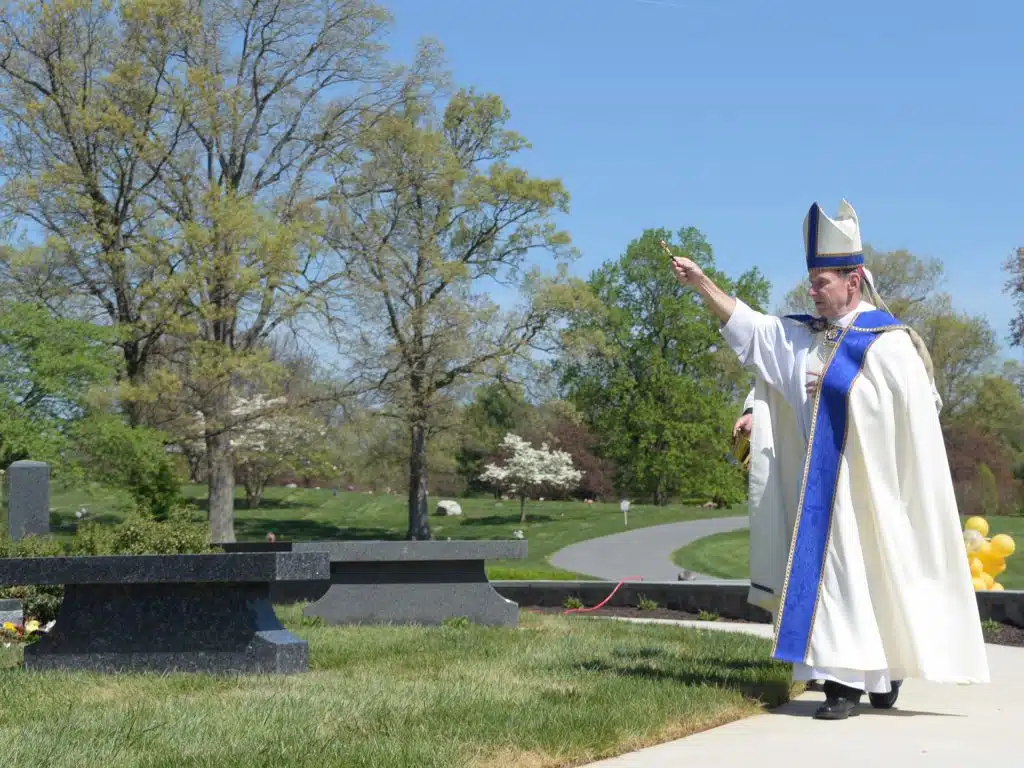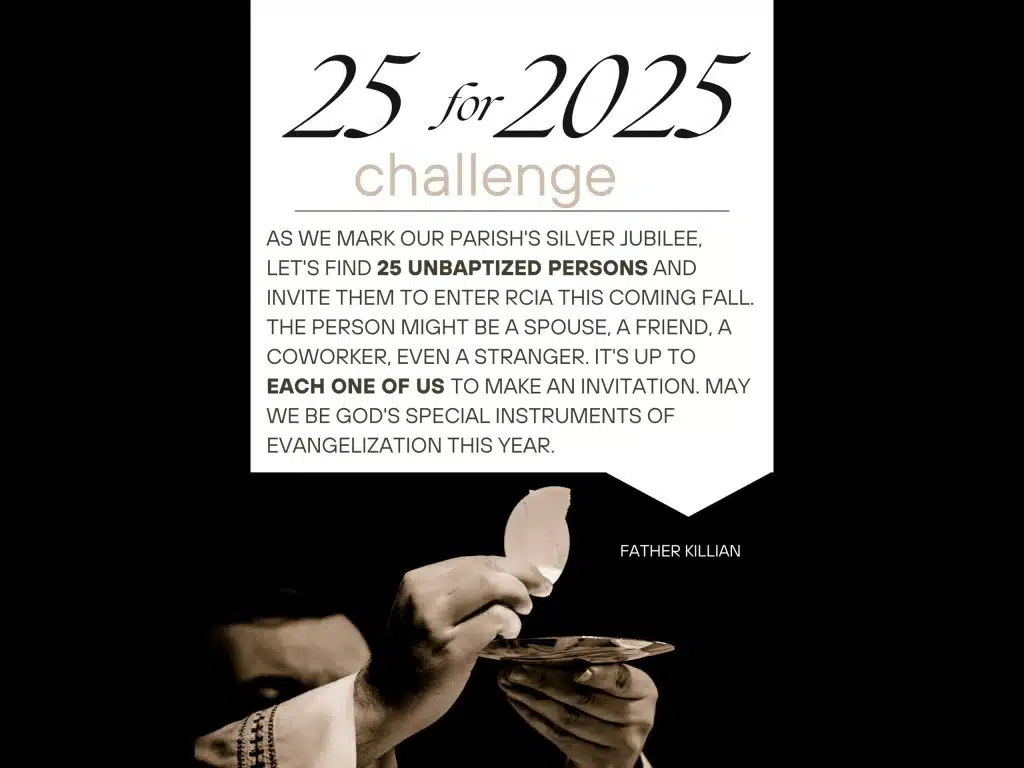In the early 1970s, a scrappy group of
parishioners from St. Joseph Church in Herndon was determined to create a
Catholic community closer to home. The Sterling Park Liturgical Committee, as
they called themselves, had the numbers and the support of the bishop. But they
were missing one thing — a priest. Atonement Father Kenneth Dougherty, who was
studying at The Catholic University of America in Washington, answered the
call.
The first Mass, celebrated March 5,
1972, in the Sterling Middle School, drew 547 people. They collected $490 for
St. Joseph, and after Mass, served 85 cups of coffee. Since then, the
Franciscan Friars of the Atonement have been there to lead and support the
Catholics in Sterling. They oversaw the congregation as they built their own church
in 1980, and expanded the facility in 2000. Today they are a multicultural community
of more than 11,000 people.
Christ the Redeemer officially became a
parish June 1, 1972. But before that, Sterling Catholic Don Miller and other
members of the committee met with Richmond Bishop John J. Russell to talk about
the future, including who would staff the parish. “(The bishop asked,) ‘What do
you think about the friar?’ And I said, ‘We love this guy, he’s fantastic,’ ”
said Miller. “I told this to the people and the chain went out and (the bishop)
must’ve gotten 75 to100 phone calls and telegrams saying they want the friars
to stay.”
Father Brian Terry, minster general of
the friars, and his family were early parishioners of Christ the Redeemer. “I
remember arriving early to Mass as a young boy to help fold up the cafeteria
tables and set out the very cold metal folding chairs,” he said. “It was a
really good community because everybody had to help.”
He remembers that when the friars first
came, they had two houses next to one another, a rectory and parish offices.
Saturday night Mass was celebrated in the nearby Baptist church, while the
Baptists would use some of the rooms in one of the houses for their religious
education. “We had this wonderful exchange,” said Father Terry. “We were always
working with the other Christian traditions in the neighborhood.”
The church hosted fundraising carnivals
and annual picnics at Algonkian Park. He and his siblings were part of the
vibrant youth ministry and the young leadership program. “Our family would say
that a lot of the leadership things we learned were from Christ the Redeemer,”
said Father Terry. “There was a great call in the community to be of service.”
As a member of the Atonement Friars, Father
Terry still knows many of the men who led the fledging church. “Some of the
founding people were very important, just showing their simplicity and
honesty,” he said. “For example, we didn’t have enough money to pay (Father
Bill Schmidt) a salary, so he worked as a teacher in the Loudoun County schools
system so that he could also help make enough money for the parish to survive.”
“What we liked about the friars was the
openness,” said Miller. “They wanted to get to know us, and so we started
having Masses in the homes. People have told me through the years that they’ve
been around other churches, but they feel so welcome at Christ the Redeemer.
They just feel at home here.”
“The idea of being welcoming, I think
that’s the hallmark of all of our parishes,” said Father Frank Eldridge,
parochial administrator since 2016.
Twenty-four years ago, Parish Administrator
Donna Ata started coming to Christ the Redeemer even though she was
Protestant. She felt welcome because of the parish’s focus on ecumenism and the
leadership of Pastor Father Donald C. Howard, she said. Ata came into the
Catholic Church in 1994, and has been a parishioner ever since.
Father Howard, who died this year at age
72, served the community for nearly 25 years. He became a parochial vicar in
1988, pastor in 1990 and retired in 2013. During that time, the number of
Hispanic parishioners grew dramatically, said Ata.
“When Father Howard started here, he
couldn’t speak Spanish. And he started teaching himself,” she said. “He would
sit down and write up his homilies, and one of our secretaries would correct
him. Then he would say his homily at the Mass and all the parishioners would
walk up to him and tell him everything he did wrong. He would travel to Mexico
in the summertime for four weeks to be totally immersed — just because the
community needed it.”
The shared chapter in the life of Christ
the Redeemer and the Atonements Friars will come to a close Sept. 1 as the Diocese
of Arlington assumes responsibility for staffing the parish. In a letter, Bishop
Michael F. Burbidge thanked the Atonement Friars for 46 years of “generous and
fruitful ministry to the parishioners of Christ the Redeemer Parish.”
“I am most grateful for the Atonement Friars
sharing their charism for promoting unity within our church during the years in
which we all witnessed tremendous growth in the Catholic population in
Sterling,” he said. “In particular, I am grateful to the friars for welcoming
and encouraging the spiritual growth of so many Spanish-speaking Catholics who
make up our diocesan family.”
Father J.D. Jaffe will serve as pastor
and Father Mark E. Moretti will serve as parochial vicar.
Though the friars will be gone, their legacy
will remain, said Ata, noting that one of their large fellowship rooms bears
the name Atonement Hall. The cornerstones on the building read, “That all may
be one,” a saying of the friars, said Father Eldridge.
Father Terry hopes the new priests will
continue the good work started at Christ the Redeemer decades ago. “It is our
greatest prayer that the new pastor and parochial vicar will be welcomed with
open hearts as we were welcomed so many years ago,” he said.



